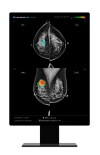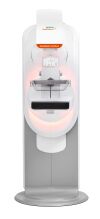Dense breasts? Depends on who you ask, say researchers
by Gail Kalinoski, Contributing Reporter | July 25, 2016
Women's Health

About 40 percent of women between the ages of 40 and 74 years old have dense breasts and many states require providers to tell women who have mammograms if that shows up on their scan. But a new study in the Annals of Internal Medicine has found that information isn’t always disclosed.
“The likelihood of a woman being told she has dense breast varies substantially according to which radiologist interprets her mammogram,” according to an abstract of the study.
The information is important because it could be a factor in developing breast cancer, along with family history of breast cancer, a personal history of breast abnormalities, age of first period and age when first giving birth. That is likely the reason about half of states in the U.S. require providers to tell women if they have dense breasts.

 It’s also important because dense breasts can make it harder for radiologists to see any abnormalities on the mammogram and often refer patients for additional screening like ultrasound.
It’s also important because dense breasts can make it harder for radiologists to see any abnormalities on the mammogram and often refer patients for additional screening like ultrasound.
With the objective of determining variation in breast density assessment among radiology practices, the researchers looked at 30 radiology facilities within the three breast cancer screening research centers of the Population-based Research Optimizing Screening through Personalized Regiments (PROSPR) consortium. Radiologists who interpreted at least 500 screening mammograms between 2011 and 2013 were included in the study, resulting in data from 216,783 mammograms from 145,123 women between the ages of 40 and 89, according to the abstract.
The survey found 36.9 percent of the mammograms were rated as showing dense breasts but the “proportion of mammograms assigned to those two categories by individual radiologists ranged from 6.3 percent to 84.5 percent,” according to the NPR. The participants in the study were 83 radiologists in Pennsylvania, Vermont, New Hampshire and Massachusetts.
“Part of the message is that the assessment of dense breasts is subjective,” lead author Brian Sprague of the Office of Health Promotion Research at the University of Vermont in Burlington told Reuters. “The paper highlights the disconnect between density laws and breast density measurement, it was never intended to be something that really dictated screening decisions.”
“The likelihood of a woman being told she has dense breast varies substantially according to which radiologist interprets her mammogram,” according to an abstract of the study.
The information is important because it could be a factor in developing breast cancer, along with family history of breast cancer, a personal history of breast abnormalities, age of first period and age when first giving birth. That is likely the reason about half of states in the U.S. require providers to tell women if they have dense breasts.
We repair MRI Coils, RF amplifiers, Gradient Amplifiers and Injectors.
MIT labs, experts in Multi-Vendor component level repair of: MRI Coils, RF amplifiers, Gradient Amplifiers Contrast Media Injectors. System repairs, sub-assembly repairs, component level repairs, refurbish/calibrate. info@mitlabsusa.com/+1 (305) 470-8013

With the objective of determining variation in breast density assessment among radiology practices, the researchers looked at 30 radiology facilities within the three breast cancer screening research centers of the Population-based Research Optimizing Screening through Personalized Regiments (PROSPR) consortium. Radiologists who interpreted at least 500 screening mammograms between 2011 and 2013 were included in the study, resulting in data from 216,783 mammograms from 145,123 women between the ages of 40 and 89, according to the abstract.
The survey found 36.9 percent of the mammograms were rated as showing dense breasts but the “proportion of mammograms assigned to those two categories by individual radiologists ranged from 6.3 percent to 84.5 percent,” according to the NPR. The participants in the study were 83 radiologists in Pennsylvania, Vermont, New Hampshire and Massachusetts.
“Part of the message is that the assessment of dense breasts is subjective,” lead author Brian Sprague of the Office of Health Promotion Research at the University of Vermont in Burlington told Reuters. “The paper highlights the disconnect between density laws and breast density measurement, it was never intended to be something that really dictated screening decisions.”
1(current)
You Must Be Logged In To Post A CommentRegisterRegistration is Free and Easy. Enjoy the benefits of The World's Leading New & Used Medical Equipment Marketplace. Register Now! |
|











JoAnn Pushkin
Educational resource about breast density
July 26, 2016 05:13
For more information about breast density, screening and risk, please visit medically sourced, educational website DenseBreast-info.org. The website contains separate data tracks for both patients and health care providers and includes an extensive list of FAQs. In addition to other components, it includes a screening flow chart, Who Needs More Screening?:http://densebreast-info.org/who-needs-more-breast-screening.aspx and a patient table: Is My Mammogram Enough? :http://densebreast-info.org/dense-breast-screening.aspx.
The educational website is supported by a 501c3 nonprofit, and accepts no advertising.
to rate and post a comment